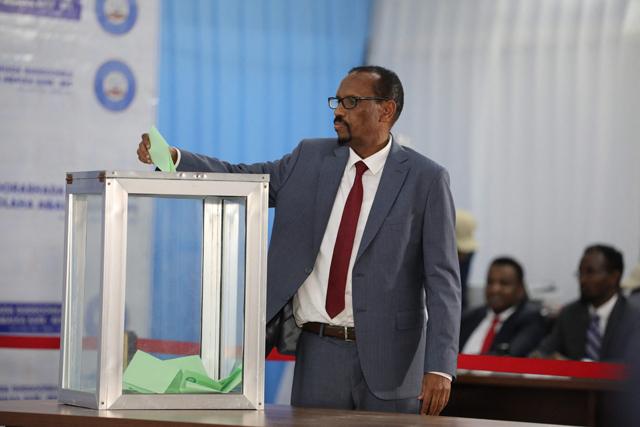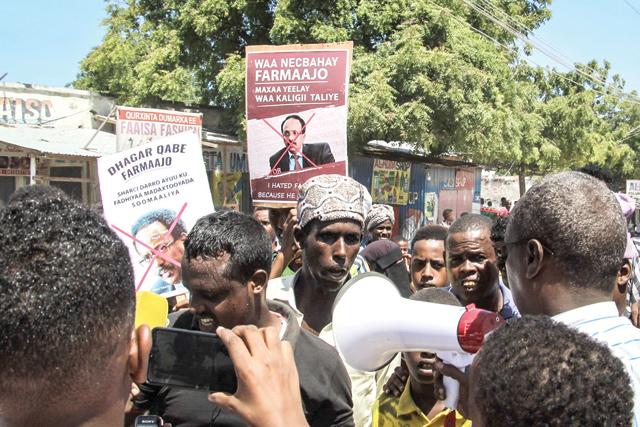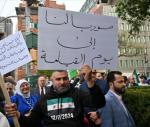You are here
Deepening Somalia crisis sparks int'l alarm
By AFP - Dec 28,2021 - Last updated at Dec 28,2021
MOGADISHU — Somalia's escalating political crisis alarmed its neighbours and Western countries as heavily armed factions patrolled parts of the capital Mogadishu on Tuesday, raising fears that the tensions could erupt into violence.
Soldiers loyal to Prime Minister Mohamed Hussein Roble took up positions near the presidential palace a day after President Mohamed Abdullahi Mohamed, better known as Farmajo, announced the suspension of the premier, who accused him of an "attempted coup".
Relations between the pair have long been frosty, but the latest developments have sparked concerns for Somalia's stability as the country struggles to hold long-delayed elections and fight a an insurgency.
On Tuesday, pro-Roble troops paraded the streets, fuelling fear among Mogadishu residents weary of armed confrontations.
"They are not far away from the main security checkpoints of the presidential palace, they are armed with heavy machine guns and RPGs [rocket-propelled grenades]", Saido Mumin, a resident, told AFP.
Another local, Abdukadir Ahmed, said that although the situation appeared to be calm, he was “really worried” about the potential for violence.
International observers have urged both sides to resolve the escalating dispute while some Somali traditional elders and politicians have also sought to calm tempers.
“Some politicians and elders [have] started going between the two sides to de-escalate the situation, but these efforts are yet to... bring about a formal resolution”, a source in the office of the president told AFP on condition of anonymity.
A coalition of opposition presidential candidates on Tuesday urged Farmajo to vacate his office immediately and called for “an urgent investigation and legal charges against Farmajo and anyone who helped him in staging the coup”.
“This failed coup was an attempt to destroy the constitutional agencies of the country”, the coalition said in a statement.
The Africa Bureau of the US State Department warned on Monday that Washington was “prepared to act against those who obstruct Somalia’s path to peace”.
“The attempted suspension of @MohamedHRoble is alarming & we support his efforts for rapid & credible elections. All parties must desist from escalatory actions & statements,” it said on Twitter.
Farmajo has accused Roble of interfering with a probe into a land-grabbing case and has withdrawn his mandate to organise elections.
Roble in turn has accused Farmajo of attempting to sabotage the vote.
International observers including the African Union Mission in Somalia, the US, the UN, the European Union, and the East African regional bloc IGAD released a statement late Monday, urging the political leadership “to put the country’s interests first”.
“International partners have repeatedly expressed growing concern over procedural irregularities and delays in the Somali electoral process,” the statement said.
In April, Farmajo sought to extend his term without holding fresh elections, triggering deadly gun battles in Mogadishu.
Roble then brokered a new timetable to a vote, but in the months that followed, the pair’s bitter rivalry derailed the polls again.
They only agreed to bury the hatchet in October, and issued a unified call for the glacial election process to accelerate.
Somalia’s elections follow a complex indirect model. Nearly 30,000 clan delegates are assigned to choose 275 MPs for the lower house while five state legislatures elect senators for the upper house.
Both houses of parliament then vote for the next president.
Elections for the upper house have concluded and voting for the lower house began in early November. But the appointment of a president still appears to be a long way off.
Analysts say the election impasse has distracted from larger problems, most notably the Al-Shabaab jihadist insurgency.
When “all the energies [are] focused on infighting and less focused on Al Shabaab, it always benefits them”, said Omar Mahmood, a senior analyst at the International Crisis Group.
“They are very adept at exploiting these political tensions,” he told AFP.
The Al Qaeda allies were driven out of Mogadishu a decade ago but retain control of swathes of countryside and continue to stage deadly attacks in the capital and elsewhere.
Related Articles
MOGADISHU — A long-running political crisis in Somalia escalated on Monday as the president suspended the prime minister, who blasted the mo
MOGADISHU — Somalia's parliament elected a veteran politician as speaker of the lower house on Thursday, as the fragile nation edges closer
MOGADISHU — Somalia's government on Wednesday urged people who had fled violence in the capital to return home, as tensions eased after the

















